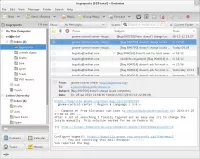QuickBooks, developed by Intuit and launched in 1992, is accounting software designed for small and medium-sized businesses. It offers both on-premises and cloud-based solutions. Key features include managing business payments, handling bill payments, and providing payroll functions. Its primary function is to streamline accounting processes for smaller businesses, helping them manage their finances more efficiently.
1983: Intuit Founded
In 1983, Scott Cook and Tom Proulx founded Intuit in Mountain View, California. This led to the development of financial management services for individuals and later, small business owners, with products like Quicken and eventually QuickBooks.
1992: QuickBooks First Introduced
In 1992, Intuit introduced QuickBooks, an accounting software package aimed at small and medium-sized businesses. The software offered both on-premises and cloud-based versions that handled business payments, bill management, and payroll.
2000: Intuit Develops Basic and Pro Versions
By 2000, Intuit had developed Basic and Pro versions of QuickBooks software, addressing the needs of a broader user base.
May 2002: QuickBooks Enterprise Solutions Launched
In May 2002, Intuit launched QuickBooks Enterprise Solutions, targeting medium-sized businesses with a more robust accounting software option.
2003: Industry-Specific Versions Launched
In 2003, Intuit began offering industry-specific versions of QuickBooks, tailoring workflow processes, reports, and terminology to different business types.
September 2005: QuickBooks Market Share
In September 2005, QuickBooks held 74% of the market share in the US, demonstrating its dominance in the small business accounting software sector.
June 2007: QuickBooks Enterprise Solutions to Run on Linux Servers
In June 2007, Intuit announced that QuickBooks Enterprise Solutions would run on Linux servers, expanding its platform compatibility from previously requiring a Windows server.
March 2008: QuickBooks Market Share
As of March 2008, QuickBooks achieved a 94.2% retail unit share in the business accounting category, according to NPD Group. This was announced in a press release on June 19, 2008.
June 19, 2008: QuickBooks Market Share Reaches 94.2 Percent
According to a June 19, 2008, Intuit Press Release, as of March 2008, QuickBooks' share of retail units in the business accounting category reached 94.2 percent, according to NPD Group. The press release also noted that more than 50,000 accountants were members of the QuickBooks ProAdvisor program.
2008: Web-Based Features Integrated
For the 2008 version, Intuit added web-based features to QuickBooks, including remote access, payroll assistance, electronic payment functions, online banking, Google Maps integration, Google marketing options, improved email functionality, Excel import, time tracking, pre-authorization of electronic funds and new Help functions.
2011: UK-Specific Version of QuickBooks Online Introduced
In 2011, Intuit introduced a UK-specific version of QuickBooks Online to address the VAT and European tax system. Customized versions were also made for Canada, India, and Australia, along with a global customizable version.
2013: QuickBooks Dominates Small Business Accounting Software Market
As of 2013, QuickBooks commanded the vast majority (up to 85 percent) of the US small business accounting software market. Despite its popularity among small business owners, professional accountants cited issues with early versions, including poor security controls and non-conformity with accounting standards.
2013: QuickBooks Online Rebuilt
In 2013, Intuit rebuilt QuickBooks Online from the ground up, creating a platform for third-party applications and customization.
May 2014: QuickBooks Online Subscriber Count
As of May 2014, QuickBooks Online had 624,000 subscribers, leading the online accounting platform market. This was compared to Xero, which reported 284,000 customers as of July 2014.
July 2014: Xero Customer Count
As of July 2014, Xero reported having 284,000 customers, while QuickBooks Online had 624,000 subscribers as of May 2014.
September 22, 2014: QuickBooks 2015 Released
On September 22, 2014, Intuit announced the release of QuickBooks 2015, incorporating user-requested features such as improved income tracker, pinned notes, improved registration process and insights on the homepage.
2014: QuickBooks Enterprise Withdrawn from UKI Market
In 2014, QuickBooks Enterprise was withdrawn from the UKI market, marking a change in Intuit's product offerings in that region.
September 2015: QuickBooks 2016 Released
In September 2015, Intuit released QuickBooks 2016, which included several enhancements and new features such as batch transaction capabilities, bill tracking, continuous feed label printer support, and batch delete/void transactions.
September 2016: QuickBooks 2017 Released
In September 2016, Intuit launched QuickBooks 2017, featuring improvements like automated reports, smart search functionality, and enhanced viewing of report filters.
2017: QuickBooks 2018 Released
In 2017, Intuit released QuickBooks 2018, adding features such as mobile inventory barcode scanning, multi-monitor support, search in the chart of accounts, etc.
September 17, 2018: QuickBooks 2019 Released
On September 17, 2018, Intuit announced the release of QuickBooks 2019, which incorporated user-requested features, including a history tracker for customer invoices, credit transfers between jobs of the same customer, and a payroll adjustment feature.
September 16, 2019: QuickBooks 2020 Launched
On September 16, 2019, QuickBooks 2020 was launched with the aim to improve the reliability and experience of using the software. The desktop versions included features like customer PO numbers in email subject lines, batch invoices, payment reminders, and easy QuickBooks version updates.
September 4, 2020: QuickBooks 2021 Rolled Out
On September 4, 2020, Intuit rolled out QuickBooks 2021 with improved payment processing and automated features. The desktop editions included streamlined bank feeds, automated receipt management, rule-based customer groups, payment reminders, data level permissions, and batch delete sales orders.
2021: QuickBooks Desktop to be Withdrawn from Sale in UK and Ireland
In 2021, it was announced that QuickBooks Desktop would be withdrawn from sale in the UK and Ireland, with the final version being the 2021 edition. The product was only available on a rental/subscription basis.
January 2023: QuickBooks Products and Services Discontinued in India
In January 2023, Quickbooks announced that their products and service offerings for accountancy and small business customers would no longer be available in India after January 31, 2023.
October 3, 2023: QuickBooks Point of Sale Software Discontinued
In early 2023 Inuit announced they would be discontinuing their Point of Sale software on October 3, 2023, including technical support and support of credit card Merchant Services, stating "the platform on which the software is built is unique, requires complex maintenance, and makes introducing new features very difficult".
Mentioned in this timeline
California is a U S state on the Pacific Coast...
India officially the Republic of India is a South Asian...

Electronic mail or email revolutionized communication by providing a digital...

A bank is a financial intermediary that accepts deposits from...

September is the ninth month of the year in the...
Trending
46 minutes ago NOAA's Spring Weather Outlook: Updated Forecasts for Texas and Northeast Ohio Released

46 minutes ago Daria Snigur and Viktorija Golubic to face off in the Oeiras 2 Jamor Indoor final.

47 minutes ago Diggins eyes Olympic finale as Karlsson withdraws from 50km cross-country due to fever.
3 days ago Alaska Airlines pilots get shocking pay raises, reshaping network and margins.
2 hours ago Hawaiian Airlines to update Airbus A330 cabins, shed widebody planes amid Alaska growth.
2 hours ago Ramadan Fasting Times Vary Globally: A Look at Suhoor and Changing Timelines
Popular

Jesse Jackson is an American civil rights activist politician and...

Barack Obama the th U S President - was the...

Bernie Sanders is a prominent American politician currently serving as...

Ken Paxton is an American politician and lawyer serving as...

Michael Joseph Jackson the King of Pop was a highly...
WWE Raw a professional wrestling television program by WWE airs...